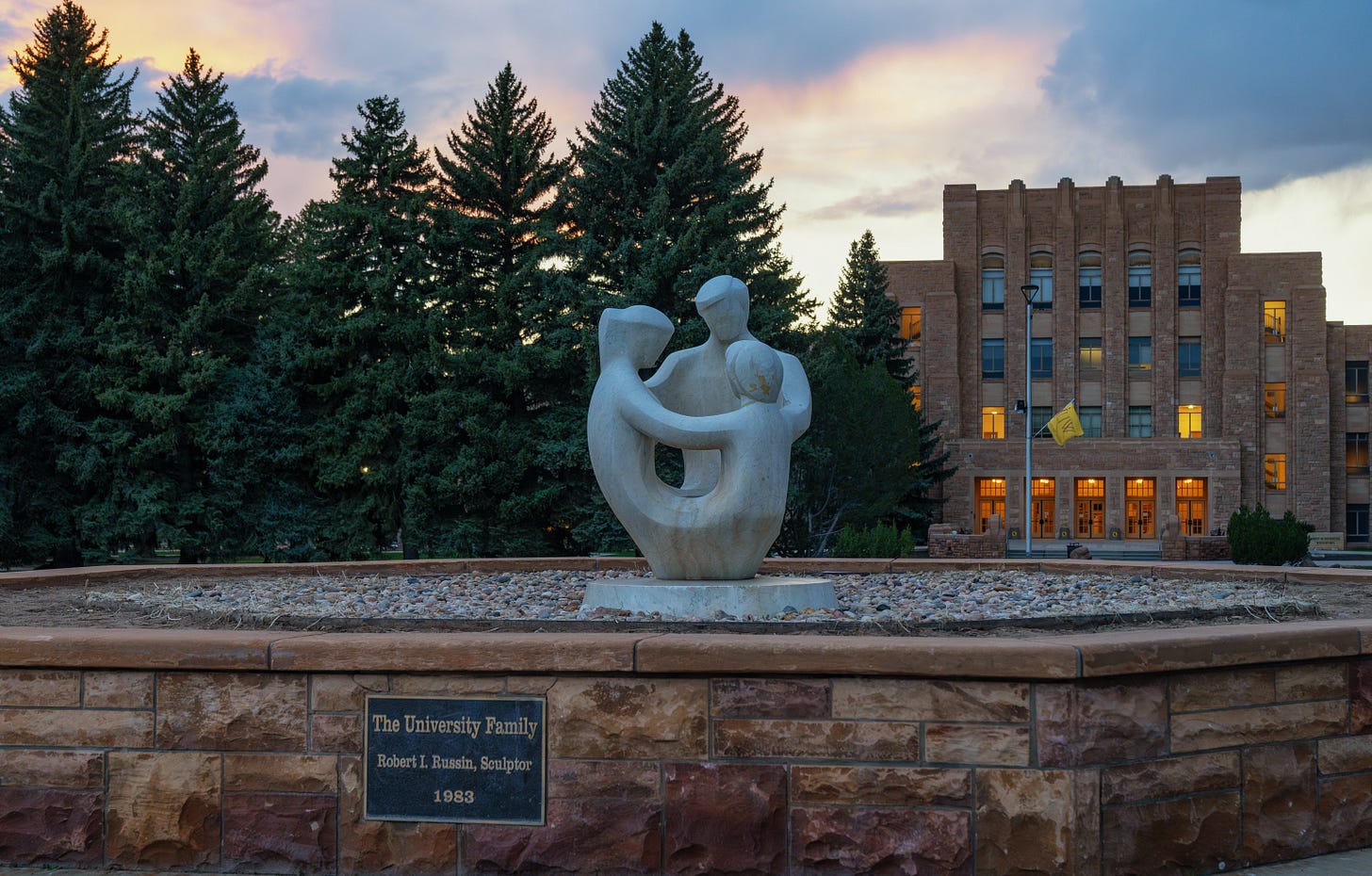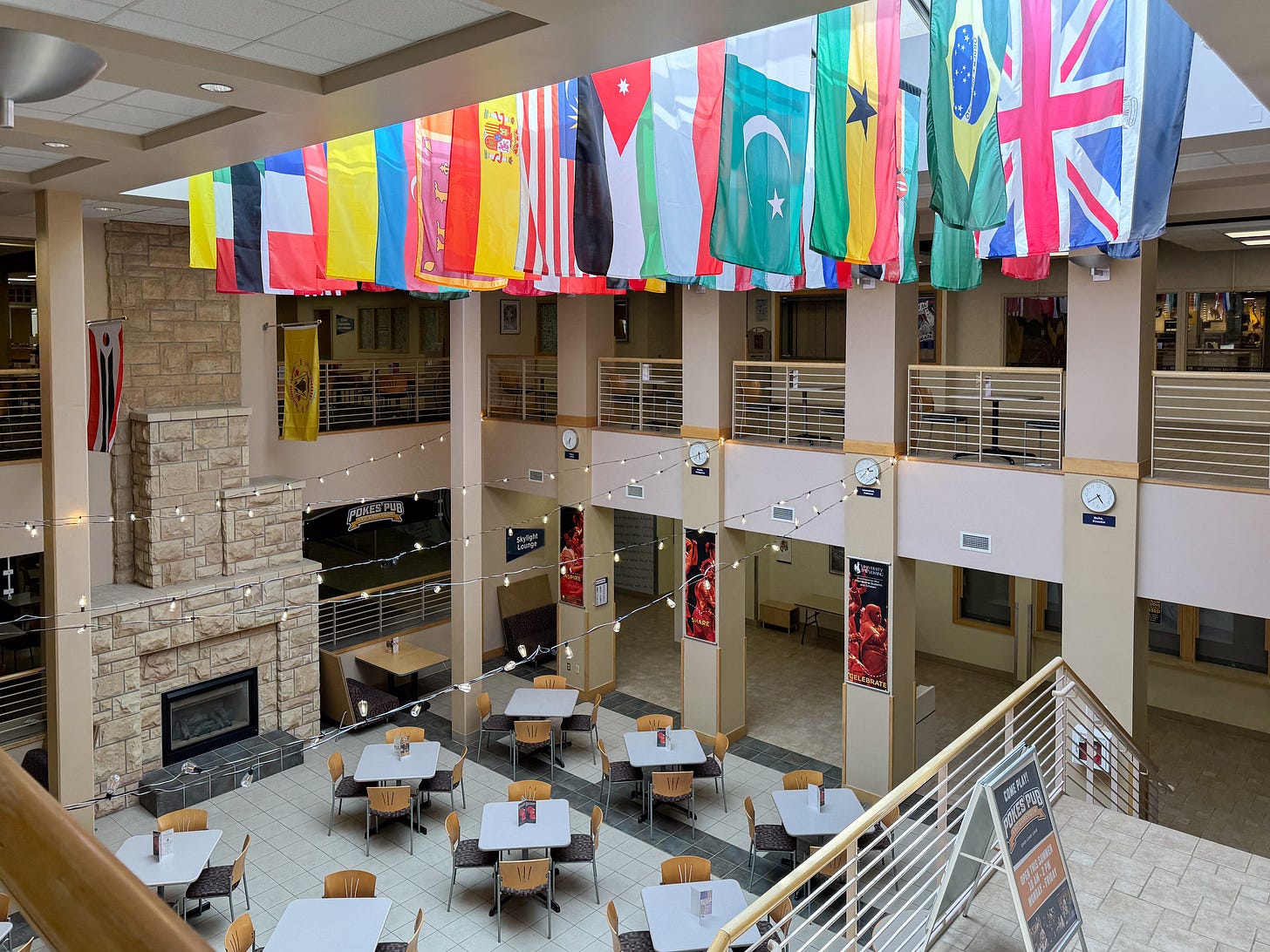“Challenges to Democracy” lecture series launches today
With plans for both on- and off-campus events, UW political scientists aim to explore voting, polarization and democracy itself with students and community members.

About half the world’s population lives in a county that has had or will have elections in 2024. But across the globe, there are challenges threatening the integrity of this core democratic practice, from polarization and populism to foreign interference and authoritarianism. Voter fraud and claims of voter fraud, whether legitimate or not, add fuel to the fire as well.
To better understand these challenges and discuss potential solutions, a coalition of researchers, lawmakers and experts — including a former U.S. ambassador — are launching a lecture series this month through the University of Wyoming’s School of Politics, Public Affairs & International Studies.
Professor Andrew Garner, a participant and moderator throughout the series, said the calendar of events includes lectures both on campus and around the state.
“With the upcoming presidential election in the fall, we thought it’d be a good time to step back and lean on the expertise of our department in the area of democracy and democracy studies and elections,” Garner said. “And try to better understand: What are the challenges that countries around the world, including the U.S., are facing?”
The series begins today with an on-campus lecture exploring “governing in a polarized environment.” The lecture will feature Wyoming Sen. Chris Rothfuss (SD-9), a Democrat, fellow Wyoming Sen. Eric Barlow (SD-23), a Republican, and former Mississippi Rep. Cy Rosenblatt, a politician who switched parties during his political career in the southern state’s legislature. Garner will moderate.
The first lecture, and many subsequent entries, tackle a prominent challenge to democracy and one familiar to Americans: the increasing temperature of partisan rhetoric.
“Polarization is certainly a challenge to democracies all around the world,” Garner said. “It’s more pronounced in the U.S. than other countries, but that’s a common challenge to democracies. As societies become more polarized, it makes it harder to govern, and it makes it easier for politicians to violate democratic norms and challenge democratic institutions.”
Polarization is not one thing; there are actually several “polarizations” measured by political scientists and pollsters — from ideological polarization (increasing disagreement about policy) to affective polarization (increasing dislike for the opposite party or its members).
“There are many different types and dimensions of polarization, and people tend to squash them all together,” Garner said.
But the difference matters. For example, affective polarization is increasing across the board; Americans have fewer and fewer warm feelings about the people on the other side of the aisle. However, ideological polarization is occurring more rapidly for politicians and extreme partisans than the average member of the electorate.
“What we know is that the American public is largely moderate on policies, and they want parties to work together, and they want the parties to sort of compromise,” Garner said. “And so that is what a large section of the American public, certainly a majority, want. And the fact that we have, at the national level, very polarized parties, is turning that group off. They’re not getting the policies they want — which could be argued is not democratic.”
Garner said one key component of lowering the temperature is simply defining democracy. He said citizens often view actions they agree with as democratic and actions they disagree with as undemocratic — whether or not those labels are accurate.
“I think too many people use the word ‘democracy’ to mean a basket of good things — that is, ‘If I don’t get these policies I want, then it’s not democratic.’” Garner said. “Well, democracy is simply a process for choosing leaders who will then enact policies based on the consent of the people.”
In a functioning democracy, Garner said, people select the candidate or party they want to govern, that party spends its term passing policies, and when the nation heads back to the polls for the next regularly scheduled election, “the public gets to decide whether they like that or not.”
“And what that means is that there are going to be situations, there are going to be frequent times when the public … chooses a party or a candidate that we don’t like, and they pass policies we don’t like,” he said. “Well, that’s actually democracy.”
The tendency to label unfavorable but democratically decided outcomes as “undemocratic” makes it more difficult to talk about the actual threats to democracy — including the truly undemocratic actions of authoritarian regimes.
Across the lecture series, UW faculty and other experts will tackle this and other issues, examining the challenges faced by the U.S. and the world’s other liberal democracies.
The talks are scheduled through November, and will be hosted by a variety of UW political science faculty — as well as scholars from abroad, including Tanja Börzel and Thomas Risse from Freie Universität Berlin and George Tawakkal of Indonesia’s Universitas Brawijaya. Election Assistance Commissioner Thomas Hicks will join a panel on “the evolution and future of voting” Oct. 15.
The series includes two book launches:
On Sept. 16, “Polarization and Deep Contestation: The Liberal Script in the United States,” a book co-edited by UW faculty and featuring contributions from others. The full book is available online for free and can be downloaded as a PDF.
On Nov. 12, “Nationalized Politics: Evaluating Electoral Politics Across Time,” a book co-authored by UW Assistant Professor Ryan Williamson exploring the nationalization and polarization of U.S. politics.
In addition to the six on-campus lectures, the series will travel beyond Laramie to Cheyenne, Casper, Sheridan and the Heart Mountain Interpretive Center between Cody and Powell.
“That commitment to take these conversations out into the state — that, at the most broad level, is a part of our land grant mission,” UW Professor Jean Garrison said.
Garrison is an expert in foreign policy and civic engagement and serves as a co-director of the Malcolm Wallop Civic Engagement Program. The program promotes civic dialogue and education in Wyoming. Notably, it maintains a database of multimedia social studies and language arts material prepared by college faculty, designed for use in K-12 schools, and available for free to the public.
The “Challenges to Democracy” lecture series dovetails with the Malcolm Wallop Program’s goals of civic engagement and of sharing academic expertise with a community that can use that information as they take part in their country’s elections this fall.
“We wanted to be part of the partnership with our school, highlighting the expertise we have on campus, to give perspective on current trends in American politics,” said Garrison, who will take part in many of the upcoming lectures.
Alongside Garrison and other faculty members, former U.S. Ambassador to Burkina Faso Tom Dougherty will join all four lectures planned around the state.
“He has a perspective on democratic trends around the world,” Garrison said. “We wanted to bring that conversation out into the state, to bring perspective to questions that people are facing every day, but also … how we fit into the larger world.”
Heart Mountain Wyoming Foundation Executive Director Aura Newlin and Sheridan High School and Sheridan College American government instructor Michael Thomas will join the panels taking place in their respective communities.
On-Campus Lectures Schedule
Tuesday, Sept. 10
Governing in a Polarized Environment: Past and Present
Time: 2:45 p.m.
Location: Skylight Lounge (Wyoming Union Basement),
Faculty and experts: Cy Rosenblatt (former member of Mississippi House of Representatives); Sen. Chris Rothfuss (SD-9); Sen. Eric Barlow (SD-23); Professor Andrew Garner (UW-SPPAIS)
Monday, Sept. 16
Book Launch & Discussion for “Polarization and Deep Contestation: The Liberal Script in the United States”
Time: 4:30 p.m.
Location: Wyoming Union Family Room
Book contributors and editors: Tanja Börzel (Chair for European Integration at the Otto-Suhr-Institute for Political Science, Freie Universität Berlin); Professor Thomas Risse (Freie Universität Berlin); Professor Stephanie Anderson (UW-SPPAIS); Professor Jean Garrison (UW-SPPAIS); Professor Andrew Garner (UW-SPPAIS); Associate Professor Peter Parolin (UW-English & Honors College)
Tuesday, Oct. 15
From Paper to Pixels: The Evolution and Future of Voting
Time: 4:30 p.m.
Location: Wyoming Union Family Room
Faculty and experts: Commissioner Thomas Hicks (Election Assistance Commission); Assistant Professor Ryan Williamson (UW-SPPAIS)
Monday, Nov. 4
Wyoming Political Attitudes: Findings from the Wyoming Election Survey
Time: 4:30 p.m.
Location: Wyoming Union Central Ballroom
Faculty and experts: Professor Emeritus Jim King (UW-SPPAIS); Assistant Professor Ryan Williamson (UW-SPPAIS) Assistant Professor Jason McConnell (UW-SPPAIS); Professor Andrew Garner (UW-SPPAIS)
Wednesday, Nov. 6
Democratic Crisis Around the Globe
Time: 4:30 p.m.
Location: Wyoming Union West Ballroom
Faculty and experts: Visiting Professor Tom Dougherty (former U.S. Ambassador to Burkina Faso); Professor George Tawakkal, (Universitas Brawijaya (Indonesia)); Professor Andrew Garner (UW-SPPAIS) Associate Professor Tom Seitz (UW-SPPAIS)
Tuesday, Nov. 12
Book Launch and Discussion for “Nationalized Politics: Evaluating Electoral Politics Across Time”
Time: 5:30 p.m.
Location: Wyoming Union Family Room
Co-author: Assistant Professor Ryan Williamson (UW-SPPAIS)

Statewide Lectures Schedule
Monday, Sept. 30
Crisis of Civility and Hope for Civic Engagement
Time: 5:30
Location: Heart Mountain Interpretive Center – Mineta-Simpson Institute Lecture Hall (Park County)
Faculty and experts: Visiting Professor Tom Dougherty (former U.S. Ambassador to Burkina Faso); Professor Andrew Garner (UW-SPPAIS); Professor Jean Garrison (UW-SPPAIS); Aura Newlin (Executive Director of the Heart Mountain Wyoming Foundation)
Tuesday, Oct. 1
Crisis of Democracy Around the World?: From Polarization to Populism and Possible Solutions
Time: 5:30 p.m.
Location: Center for a Vital Community, Sheridan College (Sheridan)
Faculty and experts: Visiting Professor Tom Dougherty (former U.S. Ambassador to Burkina Faso); Professor Andrew Garner (UW-SPPAIS); Professor Jean Garrison (UW-SPPAIS); American Government Teacher Michael Thomas (Sheridan High School)
Monday, Oct. 21
Crisis of Democracy Around the World?
Time: 5:30 p.m.
Location: UW Casper, Union/University Building (Casper)
Faculty and experts: Visiting Professor Tom Dougherty (former U.S. Ambassador to Burkina Faso); Professor Andrew Garner (UW-SPPAIS); Assistant Professor Jason McConnell (UW-SPPAIS); Professor Jean Garrison (UW-SPPAIS)
Wednesday, Nov. 20
Crisis of Democracy Around the World?
Time: 5:30 p.m.
Location: Laramie County Public Library (Cheyenne)
Faculty and experts: Visiting Professor Tom Dougherty (former U.S. Ambassador to Burkina Faso); Professor Andrew Garner (UW-SPPAIS); Assistant Professor Jason McConnell (UW-SPPAIS); Professor Jean Garrison (UW-SPPAIS)

